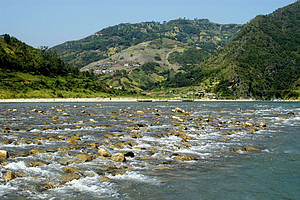Yangtze warned to prepare for more droughts, floods and storms
- First-ever large-scale report on the Yangtze and climate change adaptation released in Beijing
-Experts recommend taking “no-regrets” adaptation strategies
Beijing, China- Temperatures across the Yangtze River Basin could increase from 1.5 - 2 Degrees Celsius over the next 50 years, while extreme weather events will also become more frequent, according to the largest river basin climate vulnerability assessment yet done.
The Yangtze River Basin Climate Change Vulnerability and Adaptation Report, released today in Beijing, not only describes the impact of climate change but also offers specific adaptation strategies for the Yangtze.
“Extreme climate events such as storms and drought disasters will increase as climate change continues to alter our planet,” said Professor Xu Ming, the report’s lead researcher, professor of The CNERN Synthesis Center.
“Given the complexities and uncertainties associated with climate change, adaptation should firstly consider a ‘no-regrets’ strategy,” which does not require additional cost. If we take the right steps now, adaptation measures will pay for themselves.” he said.
Specific adaptation measures discussed in the report include strengthening existing infrastructure, such as power supply, transportation as well as river and coastal dike reinforcement. Other steps involve promoting Integrated River Basin Management (IRBM), switching to more flexible cropping systems, and reducing human impact on fragile ecosystems.
Data collected from 147 monitoring stations across the 1.8 million km2 river basin points to a 0.33℃ temperature rise during the 1990s. This hotter weather led to a spike in extreme climate events and flooding across the Yangtze basin, a trend that is expected to become increasingly dire over the next 50 years.
Other findings show that from 2001 – 2005, the basin’s climate grew even hotter, increasing by an average of 0.71℃.
According to the new report, wetlands will be the hardest hit. Lower water levels will reduce the number of aquatic birds in the Central and Lower Yangtze while climate change strips wetland ecosystems of important resources.
Other impacts that could affect the 400 million people whose livelihoods depend on the basin include more frequent snowstorms and drought.
‘The Yangtze Vulnerability Assessment is an important symbol of China’s commitment to fighting climate change,” said Mr. James Leape, Director General of WWF-International.
“Beyond setting out the vulnerabilities, the Yangtze assessment also underlines how investment in climate change adaptation is a prudent investment in safeguarding the continuing functioning of a landscape vital to many millions”
Notes
The Yangtze River Basin Climate Change Vulnerability and Adaptation Report was organized by WWF and compiled by over 20 contributors from the Institute of Geography and Sciences and Natural Resources Research, China Academy of Sciences (CAS), Institute of Applied Ecology of the CAS, Institute of Mountain Hazards and Environment of the CAS, the China Meteorological Administration (CMA), and Fudan University.
The substantial research that went into the Yangtze River Basin Climate Change Vulnerability and Adaptation Report was made possible by HSBC’s support of WWF’s Yangtze Programme, through the global HSBC Climate Partnership. The HSBC Climate Partnership is a 5-year global partnership including HSBC, The Climate Group, Earthwatch Institute, The Smithsonian Tropical Research Institute, and WWF to reduce the impacts of climate change on people, forests, water and cities.
An English-language summary of the report is available for download at
http://www.wwfchina.org/english/downloads/WWF_YangtzeVA.pdf
